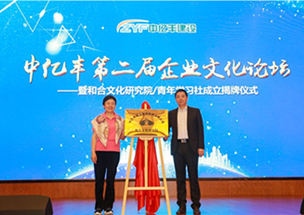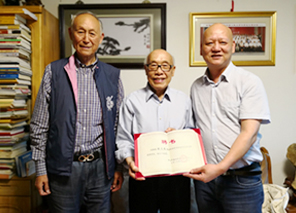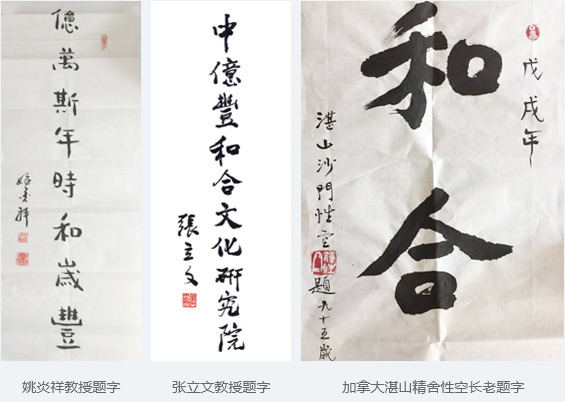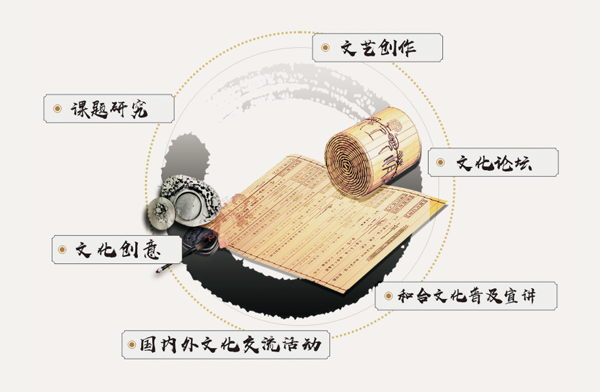HARMONIOUS CULTURE
Zhongyifeng Hehe Cultural Research Institute is a non-profit cultural research institution established by Zhongyifeng Construction Group Co., Ltd. Established on May 30, 2018, the Academy was unveiled by Ms. Du Guoling, former Deputy Secretary of the Suzhou Municipal Committee and Director of the Standing Committee of the Suzhou People's Congress, and now President of the Suzhou Council for Promoting Foreign Cultural Exchange, together with Mr. Gong Changyi, Chairman of the Zhongyifeng Construction Group.


The Research Institute accepts the leadership of the Party Committee of the Zhongyifeng Construction Group and implements the presidential responsibility system under the leadership of the Party Committee. Professor Zhang Liwen, founder of the "Harmony School" and President of the Confucius Research Institute of the Chinese People's Congress, was appointed by the Academy. Professor Yao Yanxiang, former Secretary and President of the Party Committee of the Suzhou Urban Construction and Environmental Protection Institute, and President of the Hanshan Temple Cultural Research Institute, was honorary president of the Academy. Mr. Xue Feng, Vice Secretary of the Party Committee, Vice President and Chairman of the Trade Union of China Yifeng Construction Group, serves as President.

Research Institute LOGO


Guided by Xi Jinping's socialist ideology with Chinese characteristics in the new era, aiming at researching, inheriting and promoting the culture of harmony and harmony, and based on Wu culture, the Academy focuses on the study of harmony and harmony in Chinese traditional culture, harmony and harmony in Wu culture, harmony spirit and its value at the time, harmony and harmony culture and social responsibility in Zhongyifeng, through cultural forums, subject studies, etc. Literary and artistic creation, cultural creativity, cultural exchange and cooperation, and the popularization and promotion of Hehe culture and other forms, promote the deep integration of Hehe culture and corporate culture, expand the research field of Hehe culture, and create the research brand of Hehe culture. China Yifeng Hehe Cultural Research Institute cooperates with enterprises internally to further develop the role of Hehe Culture in enterprise strategy research, industry operation,
Hehe Forum is a well-known academic exchange platform in the field of contemporary Hehe culture research. It is a cultural brand created by Professor Yao Yanxiang, the pioneer of Hehe culture research in Suzhou, after he became president of Hanshan Temple Cultural Research Institute. Since 2007, with the theme of "Hehe Culture", a "Hanshan Temple Culture Forum" has been held annually, and 11 consecutive sessions have been held so far. The themes of the first to eleventh sessions are "inheritance of culture, harmony and harmony between human beings", "harmony and harmony between human beings", "charity and harmony between human beings", "harmony and harmony between human beings", "harmony and harmony between human beings and society", "harmony and harmony between Wudi and society", "celebrity temples", "harmony and harmony between human beings", "ecological civilization, harmony and harmony between the world", "harmony and harmony and harmony". Common Destiny","Hanshan People, Harmony and Harmony". It can be seen that the biggest feature of the forum is that it has long been concerned about and focused on the study of Hehe culture, which has actually become the "Hehe Culture Forum". In order to further broaden the influence and coverage of the forum, the forum was officially renamed the "Harmony Forum" from the 11th session. The name of the forum was inscribed by Mr. Zhang Liwen, the founder of the "Harmony Forum" and a first-level professor of the National People's Congress of China. The Eleventh Forum received 1554 papers, more than 1,000 authors and more than 10 million words. Eleven papers of the Eleventh Forum were officially published, which exerted a great influence on Buddhism, academia, society and even the world. The twelfth "Harmony Forum" will be held at the end of 2018. The biggest change of this forum is that China Yifeng Construction Group, as the organizer, has entered the whole process of preparation, organization and later stage of the forum, and is participated in by China Yifeng Hehe Cultural Research Institute. With Hehe Culture as its corporate culture, China Yifeng Construction Group will contribute its strength and wisdom to the sustainable development of the Hehe Forum and assume corporate social responsibility for the research of Hehe Culture by supporting and participating in the work of the Forum.

Two-Dimensional Code of Micro-Signal in Harmony Dow
Office Address: 398 Tongjing North Road, Gusu District, Suzhou City
Tel:0512-68158526
Mail:hehewenhua@163.com。
Zhongyifeng Construction Group Co., Ltd. 苏ICP备000000号-1